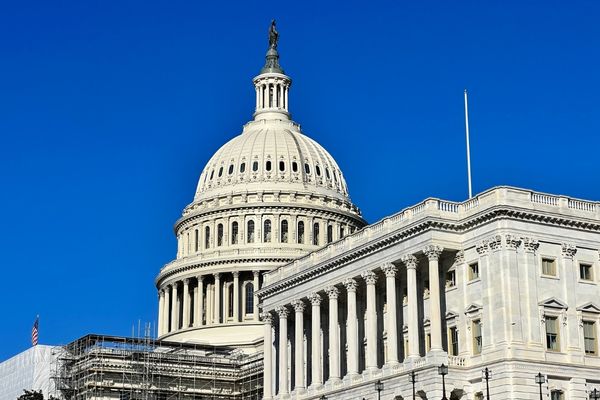
- Details
- By Darren Thompson
If signed, the Repealing Existing Substandard Provisions Encouraging Conciliation with Tribes (RESPECT) Act would abolish 11 outdated federal laws that are related to the treatment of Indians, including provisions on hostile tribes, alcohol, work requirements, penalties for truancy, and placement of youth in reform school without the consent of a parent or guardian.
 Make A Donation Here
Make A Donation Here
One of the laws paved the way for the federal government to forcibly removed American Indian children from their families to place them in Indian boarding schools.
“While we cannot rewrite the past, we need to acknowledge it and continue to strive for a more perfect Union,” Senator Mike Rounds (R-SD) said in a press release. “It’s long overdue to remove these immoral, discriminatory federal laws from our books. Throughout history, Native Americans have been subjected to unfair treatment from our federal government, including the forced removal of their children from their homes. Clearly, there is no place in our legal code for such measures, and it is appalling these laws are still in our federal code. I am pleased this bipartisan, commonsense legislation is heading to the President’s desk to be signed into law.”
The National Congress of American Indians (NCAI) praised the passage of the RESPECT Act.
“NCAI applauds the efforts made to get the RESPECT Act passed and to clear the books of some of the old legislation designed to harm Tribal Nations, and hopes that it opens the doorway for more legislation fully recognizing tribal sovereignty and promoting tribal self-determination," NCAI Executive Director Larry Wright, Jr. said to Native News Online in an email.
Other Native American leaders also applauded the RESPECT Act passage.
“The Coalition of Large Tribes (COLT) applauds the passage of the Repealing Existing Substandard Provisions Encouraging Conciliation with Tribes Act and thanks Senator Mike Rounds for his stalwart leadership of this bill. The RESPECT Act modernizes federal law to remove inconsistent federal agency consultation policies with tribal nations and their citizens. This act is an important step to restore basic dignities of Native people and honoring the United States’ solemn Trust and Treaty obligations and government-to-government relationship with tribal nations," COLT Chairman Marvin Weatherwax (Blackfeet National Tribal Business Council) said.
“It is heartening to see 11 outdated federal laws—each a vestige of colonialism—wiped off the books by the RESPECT Act. This legislation recognizes tribes as equal governments in our federalism," Co-Executive Directors OJ and Barb Semans, Four Directions Native Vote, said to Native News Online in an email.
The 11 laws to be abolished are all related to Indian Tribes, are more than 100 years old, and were done without Tribal consultation.
Want more Native News? Get the free daily newsletter today.
If signed into law by President Biden, the RESPECT Act would nullify laws that have oppressed Tribes and their citizens that were deemed “hostile” by Congress or representatives of Congress such as Indian agents.
The bipartisan effort was cosponsored in the Senate by Senators Tina Smith (D-MN), James Lankford (R-OK), Kyrsten Sinema (I-AZ), Ben Ray Luján (D-NM) and Kevin Cramer (R-ND). Representatives introduced legislation in the House by Tom O’Halleran (D-AZ), Dusty Johnson (R-SD), and Tom Cole (R-OK) on May 12, 2021.
The RESPECT Act that passed the House on Wednesday is not the same RESPECT Act introduced in the Subcommittee for Indigenous Peoples of the Unites States by Representative Raúl M. Grijalva (D-Ariz.) earlier this year. Grijalva introduced the Requirements, Expectations, and Standard Procedures for Effective Consultation with Tribes (RESPECT) Act in March 2021, which has stalled in the Subcommittee because of discussion to include or not, Alaskan Native Corporations and Native Hawaiians by the National Congress of Ame rican Indians.
Senator Rounds’ bill had support from the Great Plains Tribal Chairman’s Association and the National Congress of American Indians. The bill will next go the President’s desk for signing.
More Stories Like This
50 Years of Self-Determination: How a Landmark Act Empowered Tribal Sovereignty and Transformed Federal-Tribal RelationsTrump Veto Stalls Effort to Expand Miccosukee Tribal Lands
Oneida Nation Responds to Discovery Its Subsidiary Was Awarded $6 Million ICE Contracts
SRMT Child Support Enforcement Unit Delivers Holiday Food Boxes to Families
The Shinnecock Nation Fights State of New York Over Signs and Sovereignty
Help us defend tribal sovereignty.
At Native News Online, our mission is rooted in telling the stories that strengthen sovereignty and uplift Indigenous voices — not just at year’s end, but every single day.
Because of your generosity last year, we were able to keep our reporters on the ground in tribal communities, at national gatherings and in the halls of Congress — covering the issues that matter most to Indian Country: sovereignty, culture, education, health and economic opportunity.
That support sustained us through a tough year in 2025. Now, as we look to the year ahead, we need your help right now to ensure warrior journalism remains strong — reporting that defends tribal sovereignty, amplifies Native truth, and holds power accountable.
 The stakes couldn't be higher. Your support keeps Native voices heard, Native stories told and Native sovereignty defended.
The stakes couldn't be higher. Your support keeps Native voices heard, Native stories told and Native sovereignty defended.
Stand with Warrior Journalism today.
Levi Rickert (Potawatomi), Editor & Publisher
